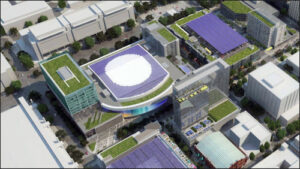 The most controversial issue facing Richmond City Council these days is the proposed Navy Hill project, a $1.5 billion urban renovation project in downtown Richmond backed by the NH District Corp., Dominion Energy CEO Tom Farrell, and Mayor Levar Stoney. Backers argue that transforming under-utilized land, much of it surface parking lots, into mixed use development will generate $1 billion in incremental new revenue for the city over 30 years and support 9,300 permanent jobs. The key sticking points are whether to build a new Coliseum, adding hundreds of millions of dollars to the project cost, and whether to extend the special tax district, which would generate tax revenue to pay off the project bonds, far beyond the boundaries of the project itself. — JAB
The most controversial issue facing Richmond City Council these days is the proposed Navy Hill project, a $1.5 billion urban renovation project in downtown Richmond backed by the NH District Corp., Dominion Energy CEO Tom Farrell, and Mayor Levar Stoney. Backers argue that transforming under-utilized land, much of it surface parking lots, into mixed use development will generate $1 billion in incremental new revenue for the city over 30 years and support 9,300 permanent jobs. The key sticking points are whether to build a new Coliseum, adding hundreds of millions of dollars to the project cost, and whether to extend the special tax district, which would generate tax revenue to pay off the project bonds, far beyond the boundaries of the project itself. — JAB
by Brian Glass
I’ve been a Commercial Real Estate Broker in Richmond since 1986. I’ve seen the failure of the 6th Street Marketplace, The Farmer’s Market makeover, and the restoration of Main Street Station and train shed — the latter two with buckets of federal money — none of which have worked out financially for the city. These fiascos show that the City of Richmond needs the private sector when it comes to re-development projects. NH District Corp. fits the bill. Here’s why:
Blight. The area proposed by NH District Corp. for re-development is blighted, with the Coliseum, built in 1971, at the epicenter. We refer to the Coliseum as “functionally obsolete.” The City has an opportunity not only to replace the Coliseum but to provide approximately 2,000 apartments, a percentage of which would be dedicated to “workforce housing,” a high rise hotel, commercial office space of up to 1 million square feet, the renovation of the historic Blues Armory, a long-sought GRTC bus transfer station, infrastructure improvements, and some retail.
Regional cooperation. Contrary to Councilman Chris A. Hilbert’s dream that “regional cooperation” can help finance replacement of the Coliseum, there is no incentive for surrounding counties to invest. The past expansion of the Convention Center worked regionally because a hotel tax basically pays for the Convention Center. Supporting the expansion cost the counties virtually nothing.
Regional competition: RVA doesn’t live in a bubble. We are competing with other cities of our size in the Southeast. Consider the example of Raleigh, N.C., where a master plan for a $1 billion project was announced in November 2019. A developer is coordinating with the city to build 790,000 square feet of office space, 125,000 square feet of retail 300 hotel rooms, 1,275 residential units and a new convention center. Just replace Coliseum with Convention Center and consider the similarities.
The arena itself: The world of entertainment has changed. Oak View Group and private-equity group Silver Lake are building arenas (10,000 to 18,000 seats) without sports teams. They’ve determined that an arena can generate as much income from concerts as they can from having an NBA basketball team or a National Hockey League team. The need for a minor league hockey team, in my opinion is a non-starter for a new arena. You can still book basketball tournaments, but the dates are set years in advance, and fewer dates are impacted. By contrast, music today is streamed, and bands rely more on concert income than ever before. The size of the proposed new arena hits the sweet spot.
Financing: Tax Increment Financing (TIF), for an 80-block area appears to be the stumbling block. The best solution would be for the Commonwealth to relinquish a portion of the sales tax so that the TIF area shrinks. That will encourage bond sales for the project. As the project builds out, tax revenue will follow. Restaurants will collect the meals tax, which will support city schools. The Co-Star Group is in discussions for a 400,000-square-foot office building with 2,000 employees, some of whom might live in the apartments that are built. Residents today like to live and play near where they work or live. Navy Hill would provide both. Also, there would be land available to lure a headquarters or regional headquarters from out of state. Catered-event sales generated from the restored Blues Armory will generate revenue over and above the entertainment tax from concerts. It all adds up to big numbers over time!
The time for analysis has ended. It’s time for action!
Brian Glass is a commercial real estate broker in the Richmond area. He has no involvement with NH District Corp.


